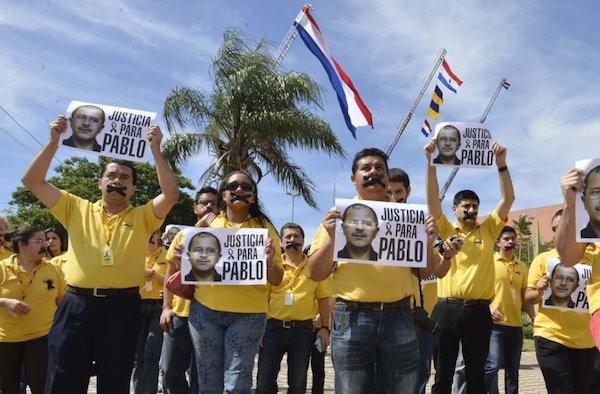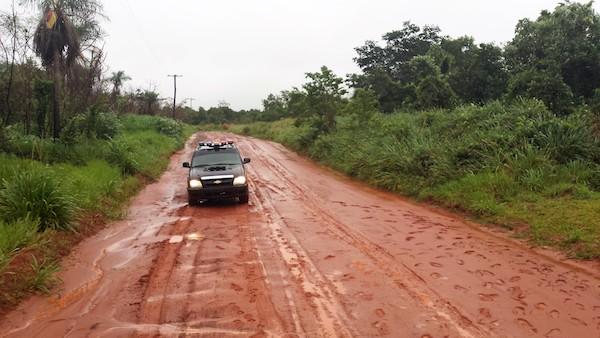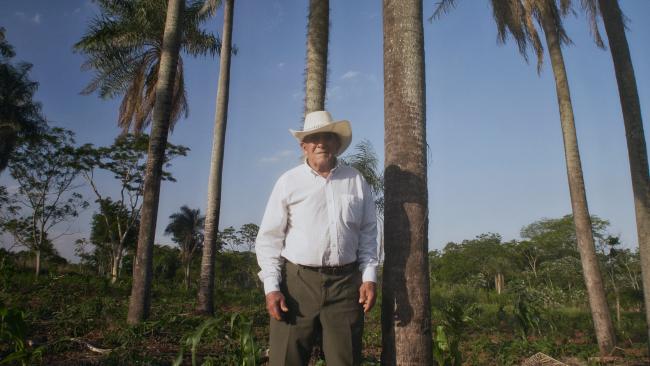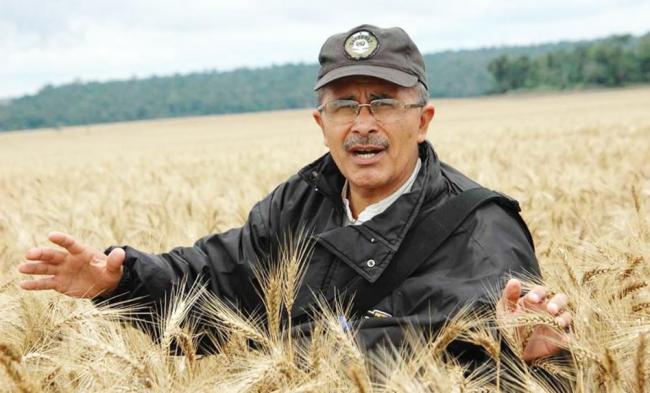
In the eastern department of Canindeyú in Paraguay, close to the Brazilian border and far from any town or village, lays the small farmer’s colony Ko'ê Porã. On a hot October morning in 2014 its residents received a visit from the regional correspondent of Paraguay’s largest newspaper, ABC Color. Pablo Medina had come to this remote place to report about an insect plague that was threatening the local manioc harvest. Tagging along were his 19-year old assistant Antonia Almada, and her older sister. Pablo, a 53-year old man with a greying mustache and kind eyes behind his rounded glasses, took notes and dozens of pictures while campesino leader Sixto Ortega guided them through the plantation. Shortly after they said their goodbyes, the journalist climbed behind the wheel of his white jeep, while Antonia jumped on the passenger seat and her sister took place in the back. They seemed relaxed and ready for the long journey back home over the largely unpaved red dirt road.
Not even an hour had passed before Ortega received a phone call from Pablo. On the other side of the line he didn’t hear Pablo but the voice of a distressed woman, begging for help while trying to hold back her tears. Two men dressed-up as soldiers had just shot Pablo and Antonia. Pablo was dead and Antonia in critical condition. The woman, Antonia’s sister Juana Ruth, had seen it all happen.
Not knowing what to do, Ortega called the first person who came to mind: Elias Cabral, the regional correspondent for Paraguay’s second largest newspaper, Ultima Hora, and founder of the popular local news station Portal de Curuguaty. Formerly known for his successful career as a local singer and dancer of folklore, he now is the first person most locals would call to report anything from a missing pet to the finding of a dead person’s body. He was also close to Pablo. After hearing Ortega out, Cabral posted the news about the suspected murder on Twitter and jumped in his car. That same morning he had tried numerous times to reach his colleague; they had planned to travel from their hometown of Curuguaty to a nearby village to report on a campesino protest. For safety reasons they almost always traveled together, often accompanied by armed police guards. But that morning, Pablo hadn’t replied to his WhatsApp messages.

When Cabral heard where Pablo’s jeep had been found he was very surprised. The road, which leads from the village of Villa Ygatimí past several Indigenous villages to the small border town of Ypehú, is one of the most dangerous roads in the region, often used by smugglers who traffic everything from cocaine and marijuana to wood, cattle, and cars. Moreover, the area was heavily controlled by the mafia gang of the then-mayor of Ypehú, Vilmar Acosta, who controlled the lucrative cross-border drug trade in that region. Knowing all this, Pablo nevertheless decided to take that road. “Pablo, who not that long ago had even participated in a professional security training for war correspondents!” Cabral still can’t believe it.
Cabral arrived to the road, consisting of nothing more than red earth with high grass and a thick layer of forest on both sides, later that afternoon, where he encountered a small crowd of villagers, most of them in tears, crowded around Pablo’s white truck. The ground was covered in bullet shells and pieces of dark glass. The once tinted car windows were completely shattered. Even though the engine was off, the windshield wipers were still moving. Antonia, who would soon die from her injuries, had already been taken away with an ambulance, leaving a pool of blood on the passenger seat.
Tilted forward against the steering wheel was the lifeless body of Pablo Medina, his chest riddled with bullets, his face covered with blood. The sight of Pablo, who, in addition to being a journalist, was also a beloved master of ceremonies, a teacher, and a local firefighter, is engraved in Cabral's memory. “I felt powerless and scared. Despite the sadness that filled me, the first thing I thought was: when will it be my turn?” He tells me this three years later, near the site of the murder, where a white memorial stone reminds passersby of Pablo and Antonia’s tragic death. Cabral’s personal bodyguard Raúl, who accompanies him everywhere due to serious threats by a local politician, lingers close behind us, carefully keeping an eye on the road.
According to Insight Crime, the Paraguayan-Brazilian border region is one of the most violent places in Latin America, with murder rates similar to Honduras and El Salvador. Paraguay leads South America in marijuana production, accounting for 15% of the world’s total output. Protected by tropical forests, it is an ideal place for Brazilian cartels to settle, due to its lack of government involvement and investment. The largest cartels, the Primeiro Comando da Capital (First Capital Command, better known as PCC) and Comando Vermelho (Red Command) fight for control of the region, each helped by Paraguayan clans who enjoy protection from corrupt politicians, judges, and police commissioners: a true narcopolítica (narcopolitics). According to estimates by Paraguay's Anti-Drugs Secretariat (SENAD), yearly cocaine smuggling profits amount to around $800 million and cannabis exports exceed $700 million. For local farmers, the situation is complex. On the one hand, they live in constant fear of criminal gangs, but at the same time they also grow marijuana because it has become increasingly difficult to make a living from traditional products like manioc, corn, and sesame.
On his weekly visit to the family grave, Pablo Medina Bernal exchanges his old farming clothes for a white linen cowboy hat and a neat blouse. Together with the disarming 79-year-old man, better known as Don Pablo, I stand in front of the turquoise tomb, a small concrete house with a pointed roof of red bricks. It is the Day of the Dead, and thus busy at the cemetery. There are people everywhere; drinking, eating and listening to music around the graves of their deceased loved ones. Behind the door of the tomb on the right lies the coffin of Don Pablo's eldest son and namesake Pablo Medina, covered with the flag of his favorite football club, Club Guaraní. His two younger sons, Salvador Medina and Salomon Medina are buried below him. On the left lies Ángela Velázquez de Medina, their mother and Don Pablo's wife. Not long after the murder of her eldest son, he says, she died of exhaustion and severe depression. Her daughter told me that in her last days, she’d said, ‘ “If my three children are already dead, why don’t we all die?’”
Like his brother Pablo, Salvador chose to become a journalist after finishing his teacher training. As a 27-year-old he had his own local radio station near his parent’s house in Capiibary, a small town that lies on the border of the eastern departments Canindeyú and San Pedro. After critical reports on deforestation implicated a smuggling gang in 2001, two men hiding in the bushes shot Salvador off his motorcycle, just a few hundred meters from the family home. Don Pablo's other son, Salomon, could not accept the death of his younger brother. With a pistol in his belt he searched the whole region for the killer, who a witness had recognized. A year later in 2002, he was killed, presumably by someone from the same criminal gang.
After visiting the cemetery we return to Don Pablo’s farm, where we sit down on white plastic chairs in the shade of his garden’s trees, joined by his daughter Maria Angela. The tereré, a typical Paraguayan drink of fresh green herbs mixed with ice-cold water, goes from hand to hand in a leather cup with a metal straw. Chickens walk freely around us while six-year-old Sofia (Don Pablo’s great-granddaughter) happily runs after them. Maria Angela, with dark hair and friendly narrow eyes, looks a lot like Pablo Medina. She begins to talk about her brother, Pablo, who was the eldest of Don Pablo’s ten children. Together with his wife and two children, Pablo lived close to his parents’ home. For years he faced threats from all kinds of criminal groups and politicians who wanted vengeance for Pablo’s publications on drug smuggling, corruption and deforestation. As someone who cared a lot for the environment, Pablo had become increasingly worried about the rapid deforestation of the Mbaracayú Forest Nature Reserve by marijuana producers, a practice considered a public secret among local inhabitants and authorities because of the economic and criminal interests involved. In 2013, a year before his death, the threats got so bad that he fled to Paraguay’s capital Asunción, where he could work at the newspaper’s main office. Far away from his home and family, Pablo, who felt very connected to the border region, was restless and unhappy. Sometimes he came to the family farm in disguise, then fled via the back door, afraid that neighboring members of criminal groups would notice him.
After several months in exile he decided to move back home permanently. “He did not want to accept that the criminals he wrote about could walk around freely, while he had to live a hidden life,” Maria Angela, his sister said with tears in her eyes. After returning it seemed that Pablo had abandoned all his fears. One day, during a family lunch about six months before his death, Pablo received an alarming call from a radio host friend in Asunción. Another journalist had just been murdered in a nearby border town and he had heard that Pablo’s name was also on ‘the list.’ After hanging up, Don Pablo begged his son to choose another profession. “I said ‘Pablo, you are so smart, you could be anything you want.’ But he said in Guarani: ‘No, Dad, I will not let them intimidate me. I am willing to give my life for this.
Some photos hang above the bed of Don Pablo's other daughter, Delia. Beside pictures of her children and grandchildren, a large portrait of her brother is placed on a poster that reads “Justicia para Pablo” (Justice for Pablo). Because Pablo worked for Paraguay's largest newspaper, his death received a lot of attention in the media, leading to street protests in both the border region and the capital. Citizens and fellow journalists carried the same poster of Pablo in their hands, sometimes interspersed with banners that read Cartes responsable. The message: Horacio Cartes, the current president of Paraguay, is responsible for Pablo’s murder.

A week after the murders of Pablo Medina and Antonia Almada, public pressure led to the creation of a parliamentary committee to investigate whether the murder of Pablo Medina and Antonia Almada had ties to “the infiltration of organized crime into politics and government institutions.” In their final report in spring 2015, the researchers mentioned the names of senators who they believe are actively involved in drug trafficking. The findings that the police, the army, the legal system, and political parties have ties to organized crime, and therefore benefit from impunity for crimes against journalists, led the committee to conclude that Paraguay is “on the edge of being a failed state”. (To this day nothing has been done with the committee’s results.)
In 2015, social pressure also led to the arrest of Ypehú’s former mayor, Vilmar Acosta, in Brazil in connection with the murder. He was extradited to Paraguay, and with a speed unusual for murder cases in Paraguay, and thanks to the crucial eyewitness (Antonia Almada's sister, Juana Ruth), the Prosecutor General’s Office concluded that Acosta had ordered the crime. On the day of the murder, October 16, 2014, Acosta's brother and cousin had followed Pablo's jeep for hours–while continuously maintaining phone contact with Acosta—before stopping to kill Pablo and Antonia.
Acosta had his reasons. Pablo had cost him and his father a year of imprisonment in 2011 after a story about the discovery of human remains on the grounds of the Acosta family ranch. After the intervention of a corrupt judge, Acosta was released a day before the mayoral election, which he then won as a candidate for the ruling Colorado party. In 2013, Pablo also wrote about the discovery of Acosta's official mayoral car stuffed with marijuana. At the time of his death, Pablo had been busy investigating Acosta's role in the murder of a political competitor a few weeks earlier. Over the past years, the mayor and his lackeys had threatened Pablo several times.

While Acosta awaited trial, his team of expensive lawyers successfully postponed the lawsuit. But at the end of October 2017, during my visit to the Medina family, court proceedings had finally begun. “We hope that justice will finally be served,” said Maria Angela, sighing as she peeked at the newspaper reports about the lawsuit from behind the dark wooden kitchen table. In order to put pressure on the four judges (each with a questionable reputation) to support the prosecution, at least one member of the Medina family attended each day of the trial. Don Pablo himself would leave his handful of cows and small manioc plantation behind almost every week to take the six-hour bus to Asunción. He is a welcome guest in the small courtroom on the second floor of the Palace of Justice. With his cowboy hat on, he always sat on the wooden bench on the right side of the room, a few rows behind public prosecutor Sandra Quiñonez. His two sons Francisco and Gaspar Medina showed up almost every day. Faced with the seemingly indifferent Vilmar Acosta, a broad man with a short neck, the Medinas remained remarkably calm.
On December 14, 2017, the court reached the following verdict: Acosta shall receive the maximum prison sentence of 39 years. The public prosecutor Quiñónez says that this means “the end of the impunity of Narcopolítica in Paraguay.” Of the 17 journalists who have been killed since the end of the dictatorship in 1989, this marks the first time that an intellectual author of a murder is convicted. The well-known investigative journalist and co-founder of Paraguay’s journalists' union, Andrés Colmán describes his feelings to me more cautiously. “This is, of course, wonderful news. However we must not forget that since Pablo's death the government has not taken any serious steps to tackle Narcopolítica. Acosta is now being put forward as a ‘rotten apple,’ while the real problem lies much deeper.”
In a glass conference room overlooking ABC Color’s main office filled with dozens of working journalists, I speak with Magdalena Benítez. As the paper’s inland section editor she manages the 25 regional correspondents who work throughout the country. The murder of Pablo Medina, at the time one of her best correspondents, came as a shock, she tells me. Although everyone knew that the region was dangerous, only after his death did she and her colleagues really come to understand how great the risks were that Pablo took while revealing crime and corruption in what Paraguayan journalists call tierra de nadie (no man's land). An apparently innocent newspaper report about a drug discovery can have major consequences. Farmers or cops can be cartel informants.
Although she declined to go into detail, Benítez indicates that ABC Color has since set up a new security protocol to better protect the correspondents. Still, the situation remains far from ideal, she confesses. After Pablo's murder, journalists exercised more caution. Although they do not want to give in to intimidation by organized crime, one of the effects has been a certain form of self-censorship. “In a country where the government gives you no guarantees; where the government not only fails to protect you, but is even actively involved in the drug trade, you start to think: how far can I go? As their editor I understand and accept that. I do not want another Pablo Medina.”
This article has been made possible with financial support from the Dutch National Postcode Lottery fund of Free Press Unlimited and the Eva Tas Foundation. It was first published in Dutch on MO* (mo.be).
Pamela Kalkman is a freelance researcher and journalist with a focus on culture and politics in Latin America and investigative projects related to the Netherlands. Find more about her on her website www.pamelakalkman.com.

